Guide to Qualifying New Suppliers in Malaysia for Manufacturing Success
Malaysia is a premier manufacturing hub in Southeast Asia. According to the Malaysian Investment Development Authority (MIDA), “Malaysia, with its extensive trade....
By AMREP | Posted on July 21, 2025
Thailand is quickly positioning itself as one of Asia’s most strategic manufacturing alternatives. Backed by over $20 billion in foreign direct investment (FDI) annually and driven by flagship projects like the Eastern Economic Corridor (EEC), the country is transitioning from traditional manufacturing into a hub for electric vehicles, semiconductors, and high-tech innovation.
With a robust logistics network, government-backed incentives, and a skilled, cost-effective workforce, Thailand is no longer just a backup plan; it is becoming a first-choice destination for companies looking to establish or expand production in Asia. This blog breaks down the key factors behind Thailand’s manufacturing ascent and what global businesses need to consider before making a move.
Thailand’s manufacturing momentum isn’t accidental; it is built on strategic advantages. Here are the core factors driving Thailand’s rapid rise as a preferred manufacturing base for global companies:
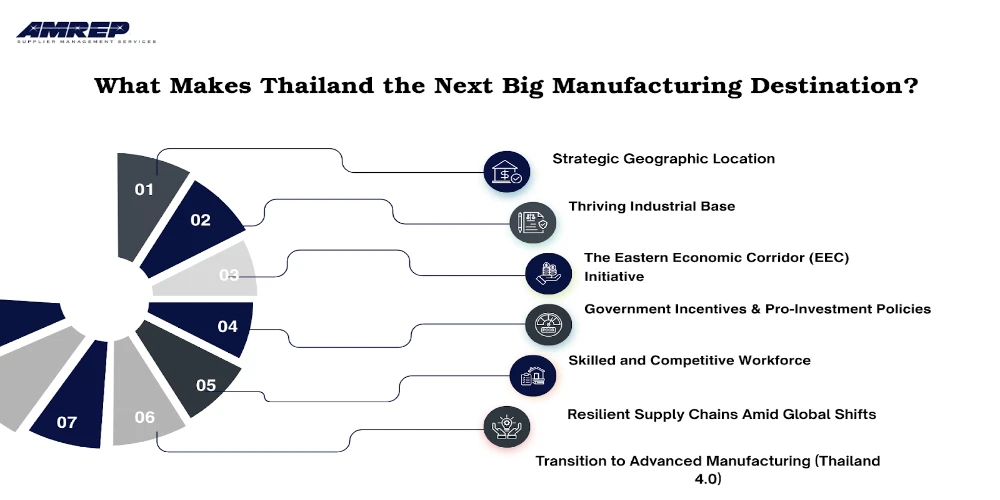
Thailand is positioned at the center of Southeast Asia, sharing borders with Cambodia, Laos, Malaysia, and Myanmar. This central location provides easy access to both the Pacific and Indian Oceans, making it an ideal gateway for trade routes connecting Asia, Europe, and the Middle East.
Thailand also offers strong regional connectivity through:
These logistics advantages allow manufacturers to move goods efficiently, both regionally and globally.
Thailand has evolved from a low-cost manufacturing economy to one with diverse, high-value industrial clusters. Its key manufacturing sectors include:
Known as the “Detroit of Asia,” Thailand is the largest automobile producer in Southeast Asia. Global automakers like Toyota, Honda, Ford, and BMW have set up major manufacturing and export bases here. In recent years, Thailand has also embraced electric vehicle (EV) production, with generous subsidies and infrastructure to attract EV manufacturers such as BYD and Foxconn.
Thailand is a regional hub for electronics assembly and component production. Global giants like Western Digital, Seagate, and Delta Electronics operate manufacturing facilities here. The Thai government is now actively promoting investments in semiconductor packaging and testing, positioning the country to benefit from global chip supply diversification.
With significant investment in the Eastern Economic Corridor (EEC), Thailand has built one of the largest petrochemical complexes in Southeast Asia. This supports a wide range of downstream industries, from packaging to consumer goods and medical equipment.
One of Thailand’s most ambitious projects is the Eastern Economic Corridor, a government-led initiative to develop a high-tech manufacturing zone across three key provinces: Chonburi, Rayong, and Chachoengsao.
The EEC offers:
This mega project is the cornerstone of the "Thailand 4.0" strategy, a national plan to shift from a labor-intensive economy to an innovation-driven one.
Thailand’s Board of Investment (BOI) provides attractive incentives to foreign and local manufacturers, including:
In addition, free trade agreements (FTAs) with countries across Asia and beyond provide tariff benefits and enhance export competitiveness.
Thailand’s labor force is one of its most valuable assets. The country offers:
Manufacturers benefit from a workforce that can support both traditional production lines and smart factory models.
The COVID-19 pandemic and U.S.-China trade tensions prompted many companies to adopt a “China +1” strategy, looking for alternative manufacturing locations. Thailand has emerged as a strong candidate due to:
Multinational corporations, particularly in electronics and automotive, are increasingly choosing Thailand to diversify their manufacturing footprints.
Thailand’s national development model, “Thailand 4.0,” emphasizes:
Government support for automation, digitalization, and sustainability in manufacturing makes Thailand a future-ready location for companies aiming to adopt Industry 4.0 principles.
Thailand offers compelling advantages as a manufacturing destination, but businesses should also consider challenges that could impact operations. Being aware of risks allows for better planning and more informed decision-making.
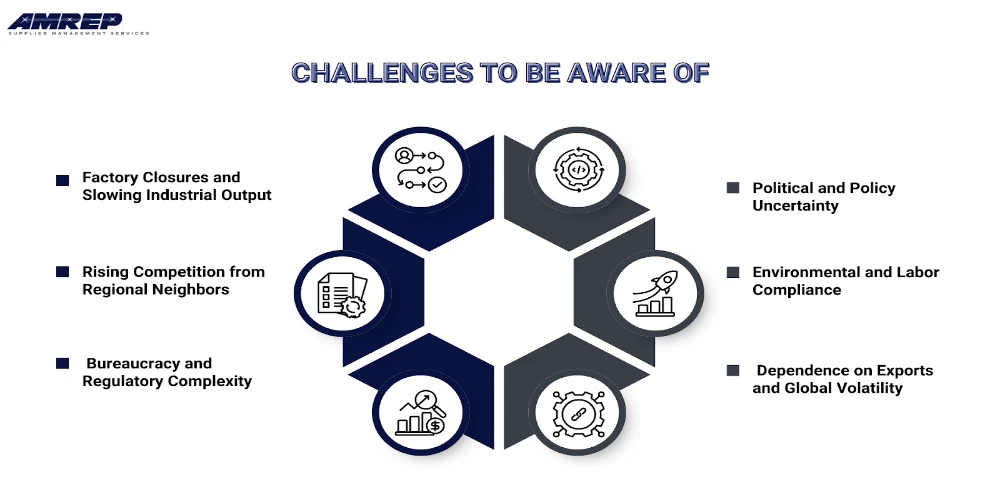
In recent years, Thailand has seen a noticeable decline in manufacturing output, particularly in traditional sectors such as garments and basic electronics. Reports indicate that over 100 factories per month have been shutting down since 2021, largely due to:
While high-tech sectors like EVs and semiconductors are expanding, this shift has left some traditional manufacturers vulnerable.
Thailand faces strong competition from countries like Vietnam, Indonesia, and India. These countries offer:
Vietnam, for example, has emerged as a key alternative for electronics manufacturing, attracting companies like Apple and Intel. Businesses comparing costs may find Thailand slightly more expensive, especially in terms of wages and land prices.
Although Thailand has made strides in improving its business environment, some foreign investors still face delays due to:
Navigating these processes can slow down project timelines unless businesses work with experienced local advisors.
Thailand has experienced political instability over the past two decades, including multiple changes in government and military coups. While the investment climate has remained largely unaffected, long-term policy continuity can be a concern for some international companies, especially when new leadership brings shifts in economic strategy or industrial policy.
Investors should stay informed about the political landscape and assess any impact on foreign investment rules or infrastructure commitments.
Sustainability standards are tightening across global supply chains, and Thailand is no exception. Manufacturers are increasingly expected to comply with:
Failure to comply can result in penalties, license suspensions, or reputational damage, particularly when exporting to markets with strict ESG (Environmental, Social, Governance) requirements like the EU or U.S.
Thailand’s economy is heavily export-driven. This makes it vulnerable to:
Events such as the U.S.-China trade war, COVID-19 lockdowns, or conflict in the Red Sea can all significantly impact Thailand’s manufacturing sector due to its deep integration in global trade.
To understand how brands ensure consistent product standards on the ground, read our guide on how quality control inspections work in Thailand.
Based on current trajectories, Thailand is on course to consolidate its position as a regional manufacturing leader:
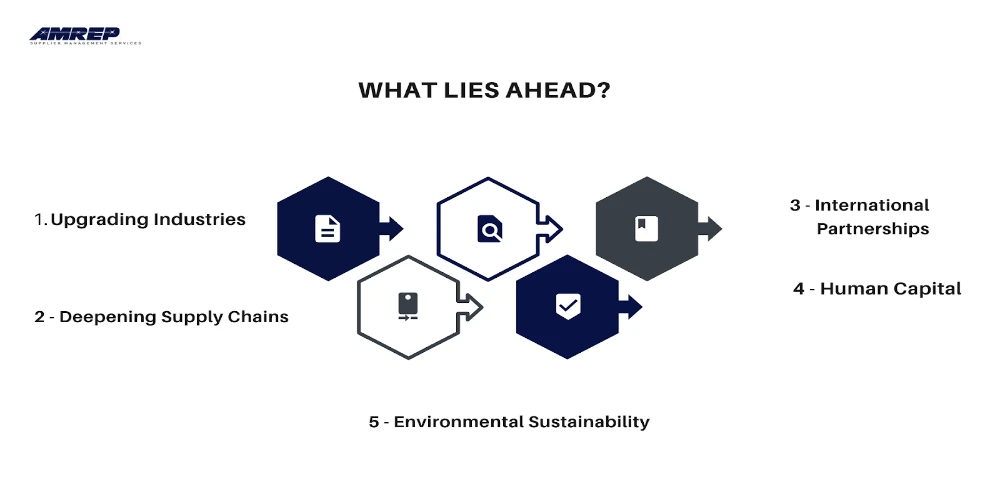
A pivot toward semiconductor assembly, AI hardware, EV components, biotech, and automation.
Development of localized Tier‑2/3 suppliers, especially around EEC industrial zones, will reduce production costs and improve resilience.
Ongoing investment from Japan, U.S., Korea, Netherlands, China, and more will drive technology transfer, efficiency gains, and scale.
Emphasis on technical training, vocational upskilling, and robotics/automation literacy aligned with Thailand 4.0 and TGI capabilities.
SEZs focused on clean energy, EVs, and low-emission production can attract ‘green’ and ESG-sensitive investors.
For a detailed breakdown of how Thailand stacks up against other major manufacturing hubs, explore our 2025 Manufacturing Cost Comparison between China, Thailand, and India.
Thailand is more than a sourcing alternative; it is a smart manufacturing hub with the infrastructure, workforce, and policy backing to support global brands. From EVs and electronics to smart logistics and biotech, the Thai government’s focus on innovation and sustainability ensures the country will remain at the center of Asia’s manufacturing future.
The shift toward diversified, high tech and resilient supply chains has placed Thailand in the global spotlight and rightly so. But with opportunity comes complexity. Vetting suppliers, verifying capabilities and ensuring production quality require more than trust. They require actionable insight through a well-executed Quality Control Inspection.
AMREP supports international brands with reliable sourcing, supplier audits, and quality control throughout Thailand and Asia. Our inspection and audit teams operate on the ground, inside factories, near ports and throughout key industrial zones, so you do not have to. Whether you are expanding operations or sourcing for the first time, we provide the local expertise and global standards you need to grow with confidence.
Contact Us To See What We Can Do
Call Us
Mon - Sat 9.00 - 18.00
Sunday Closed

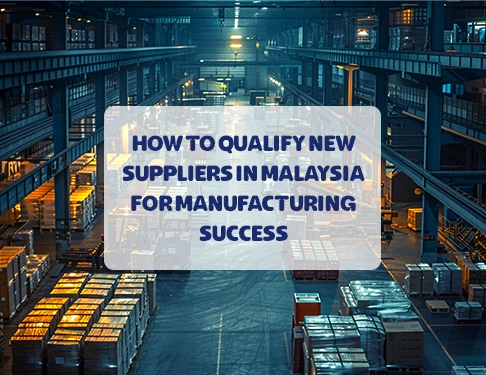
12 - May 2025
12
May
2025
Malaysia is a premier manufacturing hub in Southeast Asia. According to the Malaysian Investment Development Authority (MIDA), “Malaysia, with its extensive trade....

22 - April 2025
22
April
2025
Healthcare is rapidly evolving, ensuring consistent and high-quality patient care. Total Quality Management (TQM) in healthcare is more than just a buzzword—it is a powerful....
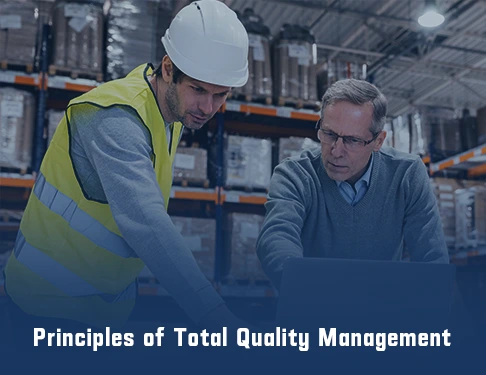
16 - April 2025
16
April
2025
Total Quality Management (TQM) is a mindset that involves everyone in the organization working toward a common goal: achieving excellence through quality. From....
